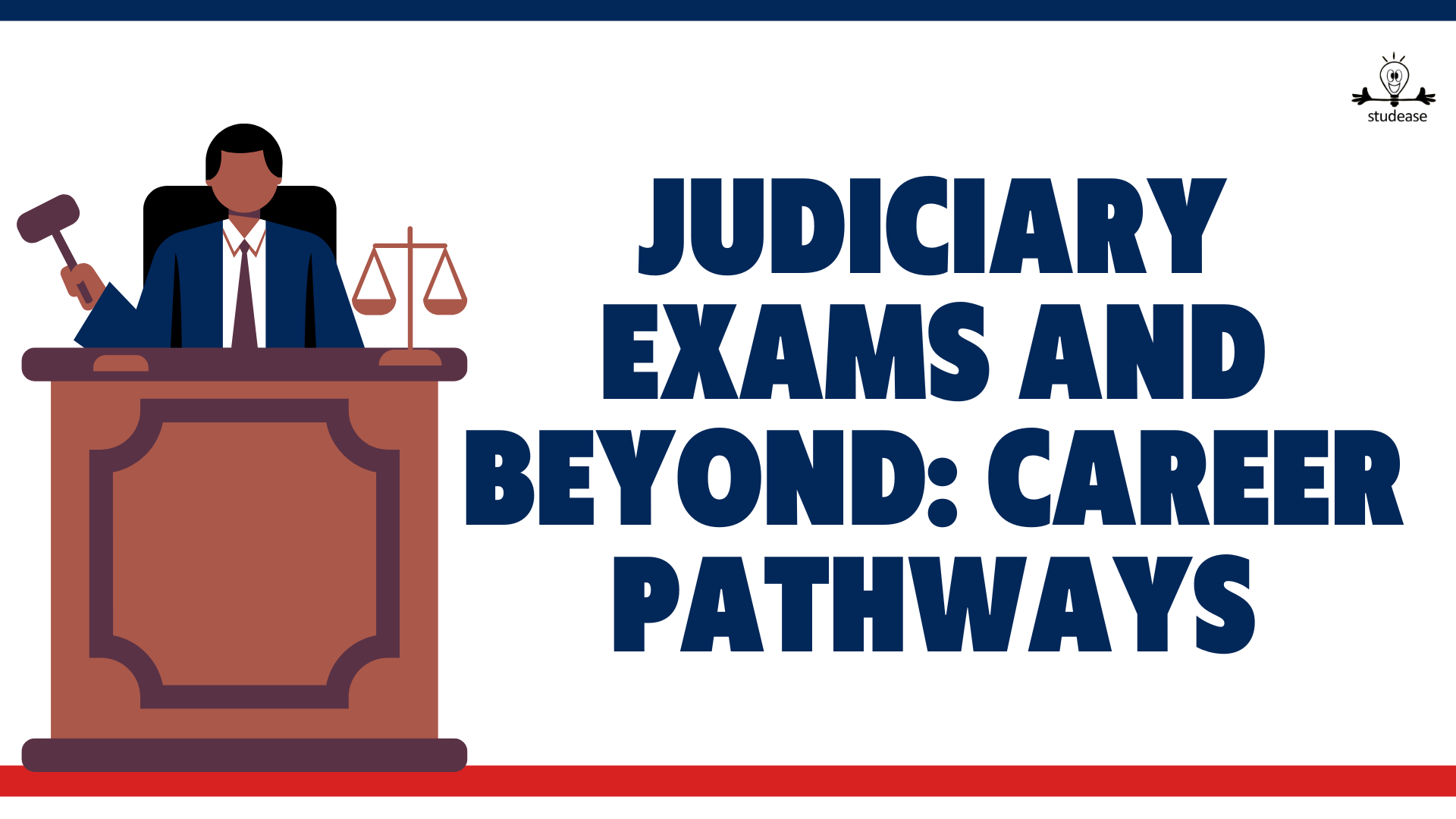Judiciary Exams and Beyond: Career Pathways

You have planned to appear for the judiciary exams and now you are wondering what your career options are. The good news is that there are a number of career pathways available to you if you start preparing for this exam.
In this article, we will explore some of the most popular career choices for judiciary aspirants.
The judiciary exam is one of the most competitive exams in the country, and cracking it is no small feat. Once you have planned to appear for the exam, you have a number of options available to you.
You can choose to become a judge, a lawyer, or even a legal advisor. Each of these career paths has its own set of challenges and rewards, and it is important to choose the one that is right for you.
In this article, we will help you explore your options and make an informed decision about your future career.
Whether you choose to pursue a career in the judiciary or in another legal field, there are a number of opportunities available to you.
From working in private practice to joining a government agency, the possibilities are endless. In the following paragraphs, we will take a closer look at some of the most popular career pathways for judiciary aspirants and provide you with the information you need to make an informed decision about your future.
Let’s Start with some fruitful prep strategies.
Preparation Strategies

Preparing for judiciary exams requires a well-planned study strategy. Here are some preparation strategies that can help you crack the exam:
Study Plan
Create a study plan that includes all the topics that you need to cover and allocate time for each topic. This will help you stay organized and ensure that you cover all the topics before the exam.
Notes-Making
Make notes while studying. This will help you remember important points and concepts and also make revision easier. Organize your notes in a way that makes it easy for you to refer to them later.
Bare Acts
Bare Acts are an essential part of the judiciary exam preparation. Make sure you read and understand all the important provisions of the relevant Acts. The most important part to mark the keywords with colored pens so that everytime you read the Bare Act, you get an idea about the important areas.
Textbooks
Choose textbooks that are recommended by experts and cover all the topics that are relevant for the exam. Reading from multiple textbooks can help you understand a topic from different perspectives. But finally compile the content and stick to that.
Previous Year Papers
Solve previous year papers to get an idea of the exam pattern and the type of questions asked. This will also help you identify your strengths and weaknesses.
Planning
Plan your preparation in a way that you cover all the topics before the exam. Make sure you allocate enough time for revision and practice.
Time Management
Time management is crucial for Judiciary Exams Preparation. Make sure you allocate enough time for each topic and also for revision and practice.
Mock Tests
Take mock tests to assess your preparation and identify areas that need improvement. Mock tests can also help you get familiar with the exam pattern and reduce exam anxiety.
Practice
Practice is the key to success in judiciary exams. Solve as many practice questions as possible and revise regularly to ensure that you remember all the important points and concepts.
Post-Exam Career Pathways
After cracking the Judiciary Exam, you have opened up a plethora of career opportunities in the legal field. Here are some of the career pathways that you can consider:
Judicial Roles and Responsibilities
If you have cleared the Judiciary Exam, you can be appointed as a Judge in a district courts. As a judge, you will be responsible for interpreting the law and delivering judgments in legal cases. You will also have the power to oversee the conduct of trials, ensure that the justice system is fair and impartial, and uphold the rule of law.
Career Advancement
After working as a judge for a few years, you can apply for higher positions in the judiciary, such as Chief Justice of a high court or a judge in the Supreme Court. You can also become a member of a tribunal or an appellate body, where you will be responsible for hearing appeals against decisions made by lower courts.
Alternate Legal Careers
If you do not wish to pursue a career in the judiciary, there are several other legal career options that you can consider. Here are some of them:
- Litigation: You can become a litigator and represent clients in legal disputes in courts of law.
- In-house Counsel: You can work as an in-house counsel for a corporation or a Government agency, where you will be responsible for providing legal advice and representing the organization in legal matters.
- Corporate Lawyer: You can work for a law firm that specializes in corporate law and provide legal advice to businesses on matters such as mergers and acquisitions, intellectual property, and contracts.
- Public Prosecutor: You can work as a public prosecutor and represent the Government in criminal cases.
- Legal Journalist: You can work as a legal journalist and report on legal issues and developments.
- Legal Researcher: You can work as a legal researcher and conduct research on legal issues and developments.
- Legal Consultant: You can work as a legal consultant and provide legal advice to individuals and businesses on a wide range of legal issues.
- Legal Aid Lawyer: You can work as a legal aid lawyer and provide free legal services to people who cannot afford to hire a lawyer.
- Mediator: You can work as a mediator and help parties resolve legal disputes outside of court.
- Law Professor: You can work as a law professor and teach law students about various legal subjects.
No matter which career pathway you choose, it is important to remember that the Judiciary Exam is just the first step in a long and rewarding legal career.
With hard work, dedication, and a passion for the law, you can achieve great success in the legal field.
Additional Considerations

After cracking the judiciary exam, there are several additional considerations that you need to keep in mind to ensure that you have a successful career in the field of law. Here are some of the key considerations that you should keep in mind:
Language Proficiency
As a lawyer, it is essential that you have excellent language proficiency, particularly in English. You need to be able to read and understand complex legal documents, as well as communicate effectively with clients and colleagues.
If English is not your first language, it is important that you work on improving your language skills. You can do this by reading newspapers, legal case laws, and legal journals in English, as well as practicing your writing and public speaking skills.
Continuous Learning and Development
The legal profession is constantly evolving, and it is essential that you keep up with the latest developments in the field. This means that you need to be committed to continuous learning and development.
You can do this by attending seminars, workshops, and conferences, as well as by reading legal journals and case laws. You should also consider taking additional courses or pursuing advanced degrees in law to enhance your knowledge and skills.
Building a Supportive Network
Building a supportive network is essential for success in the legal profession. This means that you need to cultivate relationships with other lawyers, judges, and legal professionals. You can do this by attending legal events and conferences, as well as by participating in legal internships and clerkships.
You should also consider joining legal associations and organizations to expand your network and gain access to valuable resources and information.
By keeping these additional considerations in mind, you can enhance your career prospects and achieve success in the field of law.
Remember to stay committed to continuous learning and development, work on improving your language proficiency, and build a supportive network of legal professionals to help you achieve your goals.
Conclusion
In conclusion, the Judiciary Exam is a highly competitive exam that opens up numerous career pathways for those who crack it. The exam is tough, but with the right preparation and dedication, you can clear it with flying colors.
Once you plan to appear for the exam, you can choose from a variety of career paths, such as becoming a judge, a lawyer, or a legal advisor. Each career path has its own unique challenges and rewards, and it’s up to you to choose the one that best suits your interests and skills.
Remember that cracking the Judiciary Exam is just the beginning of your journey. To excel in your career, you must continue to learn and grow, and stay up-to-date with the latest legal developments and trends.
In conclusion, the Judiciary Exam is a gateway to a fulfilling and rewarding career in the legal field. With the right mindset, preparation, and determination, you can achieve your career goals and make a positive impact in society.






